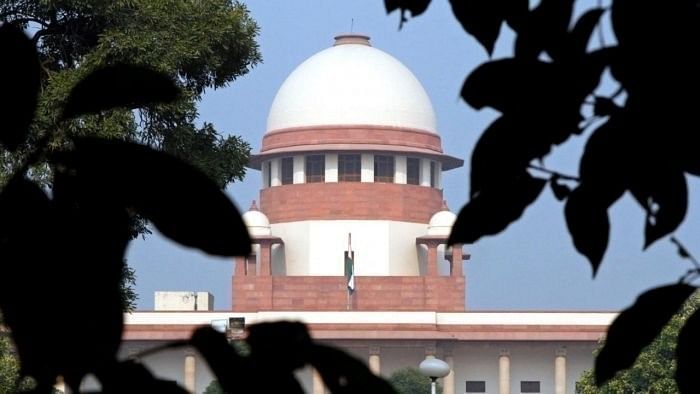
The Supreme Court of India.
Credit: PTI File Photo
New Delhi: The Supreme Court on Friday said the Comptroller and Auditor General's views about tremendous loss to the public exchequer on account of the coal rejects being disposed of by the power majors KPCL and KECML remained a view point and cannot be accepted as decisive to form the basis of a criminal proceedings.
A bench of Justices Hima Kohli and Ahsanuddin Amanullah quashed Delhi's special court, coal block scam cases' 2021 order framing charges against M/s Karnataka Emta Coal Mines Limited and Ujjal Kumar Upadhaya, Chairman and Managing Director of Emta Coal Limited for various offences under the Prevention of Corruption Act.
The court said criminal intent has been threaded into the dispute by the CBI by misinterpreting the clauses of the agreements governing the parties and by heavily banking on the observations made in the Audit Report of the CAG that has not attained finality till date.
"In view of the glaring infirmities, the orders deserve interference in exercise of the powers vested in this court under Article 136 of the Constitution," the bench said.
In the case, the bench found the CBI embarked on a roving and fishing inquiry on the strength of the Audit Report of the CAG and then started working backwards to sniff out criminal intent against the appellants.
"The underpinnings of what was a civil dispute premised on a contract between the parties, breach whereof could at best lead to determination of the contract or even the underlying lease deed, has been painted with the brush of criminality without any justification," the bench said.
Referring to Article 149 of the Constitution, the bench pointed out CAG report is subject to scrutiny by the Parliament and the government can always offer its views on the said report.
"Merely because the CAG is an independent constitutional functionary does not mean that after receiving a report from it and on the PAC scrutinising the same and submitting its report, the Parliament will automatically accept the said report. The Parliament may agree or disagree with the report. It may accept it as it is or in part," the bench said.
The Karnataka-based private firm here was accused of facilitating illegal sale of coal rejects through another firm.
Referring to the Washability Report submitted by CIMFR, Nagpur, the bench said, the entire edifice of criminality and conspiracy built by the respondent-CBI on the premise that the coal rejects had a commercial values with an assertion that the appellants had profited from the sale thereof in the open market and pocketed the sale proceeds, flies in the face.
A joint-venture agreement was executed between the Karnataka Power Corporation Limited (KPCL) and M/s Eastern Mineral and Trading Agency (EMTA) for a period of 25 years for the development of captive coal mines and supply of coal to a thermal power plant of the KPCL -- the Bellary Thermal Power Station (BTPS).
The Centre allocated three coal blocks to KPCL in Maharashtra for the development and operation of coal mines dedicated to feeding the BTPS. It was alleged that EMTA entered into a criminal conspiracy with an objective to facilitate illegal sale of coal rejects by GCWL (M/s Gupta Coalfields and Washeries Limited) that were generated during washing of coal and gained undue pecuniary advantage to the tune of Rs 53.37 crore.
In March 2022, a special CBI court, Delhi, framed charges of criminal conspiracy, breach of trust and other offences under the Prevention of Corruption Act.
In its 105-page judgment, the court said the central government had not come up with any specific plan to dispose of the coal rejects, as is apparent from a perusal of the reply submitted by the Minister of State, MoC in the Lok Sabha, stating that the government had not framed any National Policy for exploitation of coal rejects and the same was still under consideration.
“In the absence of a policy to dispose of the coal rejects, the appellants cannot be blamed for complying with the terms and conditions stipulated in the JVA,” the bench said.
The bench said the plea by the CBI that it conducted an investigation in the present case during the course of the inquiry in respect of PE-5 registered by it in the year 2012 is belied as the source information report (SIR) was on a completely different aspect.
“CBI only got activated only on stumbling upon the Audit Report of the CAG submitted in 2013. There is nothing brought on record to show to the contrary,” the bench said.
The court said prima facie it is of the view that the allegations levelled against the appellants have pre-dominant contours of a dispute of a civil nature, and it does not have the makings of a criminal offence.
